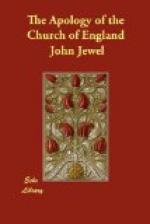We now therefore marvel the more at the unreasonable dealing of the Bishop of Rome, who, knowing what was the emperor’s right when the Church was well ordered, knowing also that it is now a common right to all princes, for so much as the kings are now fully possessed in the several parts of the whole empire, doth so without consideration assign that office alone to himself, and taketh it sufficient, in summoning a general council, to make that man that is prince of the whole world no otherwise partaker thereof than he would make his own servant. And although the modesty and mildness of the Emperor Ferdinand be so great that he can bear this wrong, because, peradventure, he understandeth not well the Pope’s packing, yet ought not the Pope of his holiness to offer him that wrong, nor to claim as his own another man’s right.
But hereto some will reply: The emperor, indeed, called councils at that time ye speak of, because the Bishop of Rome was not yet grown so great as he is now, but yet the emperor did not then sit together with the bishops in council, or once bare any stroke with his authority in their consultation. I answer, Nay, that it is not so; for, as witnesseth Theodoret, the Emperor Constantine sat not only together with them in the Council of Nice, but gave also advice to the bishops how it was best to try out the matter by the Apostles’ and Prophets’ writings, as appeareth by these his own words: “In disputation,” saith he, “of matters of divinity, we have set before us to follow the doctrine of the Holy Ghost. For the Evangelists’ and the Apostles’ works, and the Prophets’ sayings, show us sufficiently what opinion we ought to have of the will of God.” The Emperor Theodosius, as saith Socrates, did not only sit amongst the bishops, but also ordered the whole arguing of the cause, and tare in pieces the heretics’ books, and allowed for good the judgment of the Catholics. In the council at Chalcedon a civil magistrate condemned for heretics, by the sentence of his own mouth, the bishops Dioscorus, Juvenalis, and Thalassius, and gave judgment to put them down from their dignities in the Church. In the third council at Constantinople, Constantine, a civil magistrate, did not only sit amongst the bishops, but did also subscribe with them. “For,” saith he, “we have both read and subscribed.” In the second council called Arausicanum, the prince’s ambassadors, being noble men born, not only spake their mind touching religion, but set to their hands also, as well as the bishops. For thus it is written in the latter end of that council: “Petrus, Marcellinus, Felix, and Liberius, being most noble men, and famous lieutenants, and captains of France, and also peers of the realm, have given their consent, and set to their hands.” Further: “Syagrius, Opilio, Pantagathus, Deodatus, Cariattho, and Marcellus, men of very great honour, have subscribed.” If it be so, then, that lieutenants, captains, and peers have had authority to subscribe in council, have not emperors and kings the like authority?




